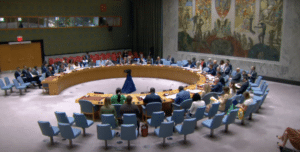An Azerbaijani blogger, Mehman Huseynov, is facing new charges, weeks before his expected release from prison after two years. Huseynov has been critical of the authorities and it is believed that these new charges are politically motivated. His case is reminiscent of a previous one: Mehman Qualandarov, also a blogger and activist, who died in custody. The authorities claims he hanged himself, but the circumstances around his death remain suspicious.
Mehman Huseynov
Mehman Huseynov is a blogger, journalist and activists. His reports were critical about the Azerbaijani authorities, exposing corruption and rights violations by the police. He also photographed different luxury houses which are owned by government officials and lawmakers and he had been critical on the nomination and appointment of Mehriban Aliyeva, the First Lady, as vice President.
A week after he posted the photos and videos of the luxury houses online Huseynov was detained and beaten up by the police. He told a judge about the violations made by the police, but no investigation followed and instead Huseynov was convicted for defamation of the police officer in question, and sentenced to two years in prison, in March 2017. Huseynov has maintained his innocent and said his conviction is politically motivated.
Huseynov was faced with new criminal charges in December, two months before his official release. He was charged of attacking a prison official, for which he can be sentenced to seven years in prison. His supporters, national and international rights organisations and experts in international bodies like the OSCE and the EU believe the charges are politically motivated and are meant to silence him. Huseynov went into hunger strike in protest against the new charges. His lawyer, Shahla Humbatova, declared that after hearing the charges on December 26, Huseynov refused food and liquids, but after December 30 he started to take (only) water again. At the same time, the prison denies that Huseynov is on hunger strike. His lawyer further declared that the hunger strike is for Huseynov the only way to fight against the injustice towards him. His situation due to the hunger strike is becoming critical. His lawyers reported on 28 December that he was too weak to walk without assistance, and claimed he had been given an injection of an unknown nature.
International involvement
Human right violations in Azerbaijan have been a concern for a very long time. All power is concentrated in the hands of the Aliyev clan, criticism on the authorities and especially President Ilham Aliyev is not tolerated and there is no freedom of the media. All kinds of independent websites are blocked and journalists and activists are often arrested. Defamation, just like in Huseynov’s case, is regularly used to imprison those who are critical of the regime.
Different organizations are demanding the release of Huseynov. Among them, members of the Parliamentary Assembly of the Council of Europe (PACE), Human Rights Watch (HRW), Amnesty International, Human Rights House Foundation and other watchdogs. Two members of the PACE, Roger Gale and Stefan Schennach consider Huseynov a political prisoner. Aliyev has denied the presence of political prisoners in Azerbaijan, but according to the Centre for the Protection of Political Prisoners, there are currently 150.
Roger Gale and Stefan Schennach were part of a special committee of PACE, on the Prevention of Torture and Inhuman or Degrading Treatment or Punishment (CPT). The committee visited Azerbaijani six times in 2004, 2012-2017 and published their report last year. According to the report, torture and repression by the police and other law enforcement agencies is common and the entire law system is considered corrupt. President of the CPT, said “It is high time that the Azerbaijani authorities took decisive action to stamp out torture in the country and implement to the fullest extent the Committee’s recommendations”. Both Gale and Schennach expressed their concern about Huseynov and his current health situation due to his hunger strike.
Sources: RFEL, RFEL II, Washington Post, Council of Europe, Pen America, RFEL
Photo: Wikipedia Commons



